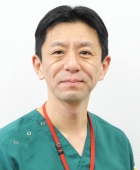Centers & Services
Top > Centers & Services > Central Clinical Services > Department of Clinical Engineering
Department of Clinical Engineering
Thirty-seven clinical engineers belonging to the Department of Clinical Engineering provide services at various locations throughout the hospital to support the advanced specialized medical treatment that university hospitals are expected to provide.
ME equipment management
The ME Center, as it is commonly known, houses approximately 3,000 ME devices, and performs central management operations for those devices. In principle, one ME device is used on a single patient before it is returned to the ME Center for cleaning and end-of-day inspections, to ensure that it can always be used in good hygiene and safety conditions. More detailed inspections are carried out on a regular basis for life support equipment such as ventilators, with the goal of
maintaining thorough safety management.
Blood purification-related activities
The Department of Blood Purification Therapy operates and assists in the treatment of more than 3,000 annual cases of hemodialysis, intermittent hemodiafiltration (I-HDF), plasma exchange therapy, and other apheresis therapies. We also offer safe blood purification therapy while performing regular maintenance and management of blood purification devices. In recent years, quality control of the water used for dialysis has become very important, and to this end, clinical engineers monitor and manage the water at our facility to ensure that it is ultrapure.
Operating rooms and extracorporeal circulation-related activities
Clinical engineers are in charge of conducting equipment management, artificial heart and lung-related activities, and assistive circulatory device management for the Department of Surgery. This department’s medical equipment is centrally managed to ensure efficient operation – we assign devices according to their inspection status or the surgical procedure involved, and promptly respond to problems as soon as they arise. Around 250 operations using artificial hearts and lungs are performed annually for a variety of cases, including neonatal congenital heart disease, ischemic heart disease, and aortic disease, and the clinical engineers are in charge of operating the artificial organs. Approximately fifty to sixty ECMO procedures are carried out annually, and this number has been on the rise in recent years. From implementation of the devices to management of devices currently in use, we make efforts to ensure that procedures are carried out appropriately in cooperation with other medical staff. The hospital has around seventy patients with fully implantable artificial hearts, and provides support for these patients so that they can feel comfortable recuperating at home.
Angiography room-related activities
In the angiography room, we are mainly responsible for carrying out examinations and treatments in the cardiovascular and pediatric fields. We also operate and maintain medical equipment used to examine and treat ischemic heart disease, arrhythmia, and heart failure. We are available twenty-four hours a day to perform an emergency catheterization, or to treat acute myocardial infarction or other
conditions.
Intensive care-related activities
Many medical devices such as ventilators, CRRT and ECMO are used in the intensive care unit for post-surgery patients, as well as for patients whose respiratory, circulatory, and metabolic functions have deteriorated. Clinical engineers check the operation status of medical equipment around the clock and suggest device settings based on the patient’s condition.
Training
In recent years, we have particularly been focusing on the safety management of medical equipment and currently host around 230 training sessions per year. We are also actively involved in servicing the hospital’s equipment and designing internal facilities, thereby contributing to the establishment of a better medical system.
Kent Doi
Departments/Divisions
Emergency and Critical Care Medicine, Critical Care and Emergency Medical Center/ER, Department of Intensive Care Unit, Department of Clincal Engineering, Department of Disaster Medical Management
Titles
M.D., Ph.D.
Expertise/Specialties
Critical care medicine, Emergency medicine, Nephrology
Research Interests
Sepsis, Multiple organ failure, Acute kidney injury, Blood purification
Languages
English/Japanese

